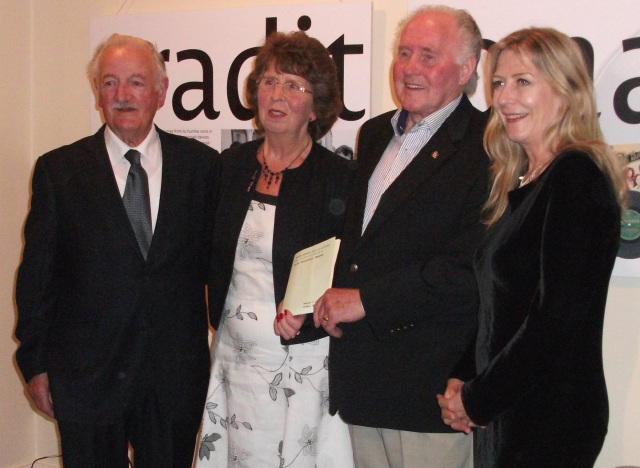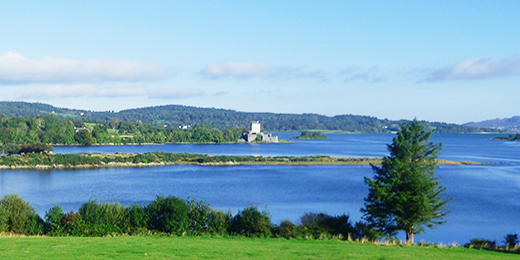Doe Castle is situated on a breathtakingly beautiful inlet of Sheephaven Bay in north west Donegal. It was the ancient seat of the Mac Sweeney Chiefs of Doe and has its own tragic romance and history.
While Verona had Romeo and Juliet so Creeslough had its own star crossed lovers, Turlogh and Aileen. Their fateful story is told in the following song written last century by Níall Mac Giolla Brigde from Feymore, Creelsough.
~~~
Maolmurra – A Ballad of Doe Castle
Wild are thy hills, O Donegal! that frowning darkly rise
As if to greet the mist that falls upon them from the skies:
Dark, dark thy hills, and darker still thy mountain torrents flow,
Yet still more dark Maolmurra’s heart in his Castle Hall at Doe.
Fair are thy plains, O Donegal! and calm thy winding streams
Flow gently by each hut and hall, beneath the bright sunbeams;
But plain or stream, or meadow green, or flower upon the lea,
Were not more mild than Maolmurra’s child, so sweet and fair was she.
Stout grows thy oak, O Donegal! and straight thy ashen tree,
And swift and strong thy sons so tall, their country’s pride to see;
But oak or ash, or young men all, that sprung from Irish soil,
Were not more stout, straight, swift and tall, than the chief of Clan O’Boyle.
He was the pride of Faugher side, near the hills of Ballymore;
For feats of strength none equaled him from Fanad to Gweedore:
And he would go through frost and snow on the merry Christmas Day
With ringing cheer to hunt the deer from his haunts in dark Glenveigh.
And often in Doe Castle woods he’d hunt the deer and hare,
But the witching deer that drew him there was Maolmurra’s daughter fair;
And there was no man in all the land that trod on Irish soil
Maolmurra’s daughter loved so well as Turlogh Og O’Boyle.
In Duntally Wood, as best he could, his love for her he vowed:
But her father, overhearing him, chastised O’Boyle aloud;
With haughty pride, he says: “Abide by Faugher at the sea,
For you’ll never wed the daughter of Maolmurra of Castle Doe. “
In his little boat O’Boyle would float, a-fishing he would go,
With hook and line to Lackagh’s stream that runs near Castle Doe;
High in the Castle tower his loved one lay confined,
And on its lofty battlements in sorrow deep she pined.
At the Castle strand two boats lay manned to wait the rising tide,
Maolmurra there in chief command right cowardly did hide;
And when O’Boyle his homeward course steered by the Bishop’s Isle,
They there waylaid and a prisoner made of fearless young O’Boyle.
They brought him to the Castle, in strong irons he was bound,
And by Maolmurra was confined in a dungeon underground;
But in a few days after, inside the graveyard wall,
Four stalwart ruffians bore a bier, wrapped in a funeral pall.
Poor Aileen, from the tower high, beheld this mournful scene,
In mute amaze she cast a gaze on the castle graveyard green;
All pale in death, beside a mound of freshly risen soil,
The pall removed, she there beheld the features of O’Boyle.
Then with a shriek she madly leapt from the tower to the ground,
Where by her faithful waiting maid her gory corpse was found;
And in Doe Castle graveyard green, beneath the mouldering soil,
Maolmurra’s daughter sleeps in death with Turlogh Og O’Boyle.
And fishers say along the beach a phantom boat does glide
By pale moonlight, at dead of night, there on the silvery tide,
And in that boat two figures sit, upon each face a smile:
They say it is young Aileen fair and Turlogh Og O’Boyle.
~~~
This old ballad appears in ‘Heather Blossoms, Songs in Irish and English’ by Níall Mac Giolla Brigde (Neil McBride), himself a famous local man.
As well as a published author Neil McBride is known as the only person ever to have been defended in court by Padraig Pearse. This seemingly unlikely event in Irish history happened as a result of the banned use of the Irish language at that time. In early 1900’s all carts had to display the name of the owner as an early form of vehicle registration and Neil, with the help of his friend Andrew MacIntyre from Ballymore, fashioned a name plate out of an old cocoa tin and put his name on, in Irish.
Neil was deemed to have broken the law because his name plate was illegible (because it wasn’t in English) and was therefore illegal. He was subsequently fined 1 shilling at Dunfanaghy Parish Sessions.
Feeling aggrieved on his friend’s behalf Andrew felt passionately that Neil should appeal his fine and so approached another friend and local fellow member of the Gaelic League, Padraig Pearse, to see what could be done. Pearse agreed to defend Neil for free however, as history shows, he lost the case.
Fast forward to more recent times when local historian, author and fellow Creeslough man, Seamus Harkin found a long lost copy of Neil’s book ‘Blta Fraoic’ or ‘Heather Blossoms’. Having been originally printed in 1905 it had been out of print for years.

left to right: Dermot MacIntyre, son of Andrew, Tessie and Seamus Harkin and Mairead Mooney launching ‘Blta Fraoic (Heather Blossoms)’ by Níall Mac Giolla Bridgde.
Maolmurra – A Ballad of Doe Castle is one of eighteen songs and ballads re-produced and now published once more. Seamus says “Because this book is of cultural importance it deserved to be re-printed so that more people can see this great work. My reason for printing this book is to let people, especially the young, know the great wealth of talent we had in the parish.”
A revised copy of ‘Blta Fraoic (Heather Blossoms)’ by Níall Mac Giolla Brigde costs €5 and all proceeds go to Muckish Development Committee. You can contact us to purchase a copy.


[…] It was the ancient seat of the Mac Sweeney Chiefs of Doe and has its own tragic romance and history. […]